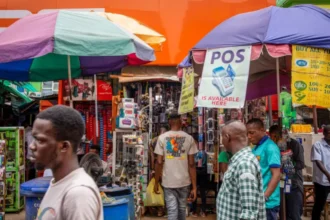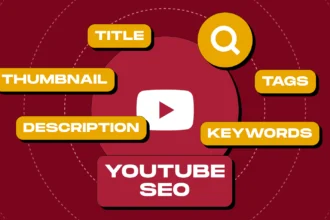What is Programmatic Advertising and How Does it Work in Nigeria?
Programmatic advertising is changing how businesses reach their audiences online. In Nigeria, where digital marketing is growing fast, programmatic advertising offers a smart way to place ads efficiently. This guide explains what programmatic advertising is, how it works, and why it’s a game-changer for businesses in Nigeria. Whether you’re a small business owner or a marketer, understanding programmatic advertising can help you boost your brand’s visibility and connect with customers.
- What is Programmatic Advertising and How Does it Work in Nigeria?
- What is Programmatic Advertising?
- Why Programmatic Advertising Matters in Nigeria
- How Does Programmatic Advertising Work?
- Types of Programmatic Advertising
- Benefits of Programmatic Advertising in Nigeria
- Challenges in Nigeria
- How Nigerian Businesses Can Get Started
- Why Programmatic Advertising is Growing in Nigeria
- Conclusion
What is Programmatic Advertising?
Programmatic advertising is the automated process of buying and selling digital ad space using technology. Instead of negotiating with publishers directly, businesses use software to purchase ads in real time. This method relies on data to target specific audiences, ensuring ads appear where they’re most likely to get noticed. In Nigeria, programmatic advertising is gaining traction as internet access grows and more people use smartphones and social media.
Think of it like an online auction. Advertisers bid for ad space on websites, apps, or social platforms, and the highest bidder’s ad gets shown. The process happens in milliseconds, making it fast and efficient. According to industry reports, programmatic advertising accounts for over 80% of digital ad spending globally, and Nigeria is catching up as businesses embrace this technology.
Why Programmatic Advertising Matters in Nigeria
Nigeria’s digital landscape is booming. With over 100 million internet users and a young, tech-savvy population, the country is a hotspot for digital marketing. Programmatic advertising fits perfectly because it:
- Targets specific audiences, like young professionals in Lagos or students in Abuja.
- Saves time by automating ad placement.
- Reduces costs by focusing on high-value viewers.
- Works across platforms, from mobile apps to websites.
For example, a Nigerian e-commerce brand can use programmatic advertising to show ads to people who recently searched for similar products, increasing the chances of a sale.
How Does Programmatic Advertising Work?
Programmatic advertising involves several steps and tools. Here’s a simple breakdown of how it works in Nigeria:
1. Define Your Audience
The first step is knowing who you want to reach. Advertisers use data to create audience profiles based on age, location, interests, or online behavior. For instance, a Nigerian fashion brand might target women aged 18-35 in urban areas who follow fashion blogs.
Data comes from various sources, like website visits, app usage, or social media activity. In Nigeria, platforms like Google and Facebook provide rich data for targeting, while local ad networks also offer insights into consumer behavior.
2. Set Up the Campaign
Advertisers use a Demand-Side Platform (DSP) to manage their campaigns. A DSP is software that lets you buy ad space across multiple websites or apps. You set your budget, choose your audience, and decide where your ads should appear, like on news sites, blogs, or social media.
In Nigeria, popular DSPs include Google Ads and local platforms like AdX. You also pick the ad format, such as banners, videos, or native ads that blend into the website’s content.
3. Real-Time Bidding (RTB)
Most programmatic advertising in Nigeria uses real-time bidding. When someone visits a website or app, an auction happens in milliseconds. Here’s how:
- The website sends user data to an ad exchange, a marketplace connecting advertisers and publishers.
- Advertisers bid through their DSP based on how valuable the viewer is to them.
- The highest bidder’s ad gets displayed.
For example, if a Nigerian user browses a tech blog, a smartphone brand might bid to show an ad for their latest model.
4. Ad Delivery and Tracking
Once the ad is placed, it appears instantly to the user. The DSP tracks performance, like clicks, views, or conversions. This data helps advertisers tweak their campaigns for better results. In Nigeria, where mobile usage is high, tracking mobile ad performance is crucial.
5. Optimization
Programmatic advertising lets you adjust campaigns in real time. If an ad isn’t performing well, you can change the audience, budget, or creative elements. For instance, a Nigerian food delivery service might notice their ads perform better on weekends and shift their budget accordingly.
Types of Programmatic Advertising
Programmatic advertising isn’t one-size-fits-all. Here are the main types used in Nigeria:
- Real-Time Bidding (RTB): Open auctions where anyone can bid for ad space. Common for small businesses in Nigeria.
- Private Marketplace (PMP): Exclusive auctions for select advertisers, often used by big brands for premium ad spaces.
- Programmatic Direct: A direct deal between advertiser and publisher, with no auction. Ideal for guaranteed ad placements.
Each type suits different goals. RTB is great for reaching wide audiences, while PMPs offer more control for high-value campaigns.
Benefits of Programmatic Advertising in Nigeria
Programmatic advertising offers unique advantages for Nigerian businesses:
- Precision Targeting: Reach the right people based on their online habits, like shoppers in Lagos or gamers in Port Harcourt.
- Cost Efficiency: Pay only for ads shown to your target audience, reducing wasted spending.
- Scalability: Easily scale campaigns to reach more people as your budget grows.
- Real-Time Insights: Track performance instantly and make data-driven decisions.
For example, a Nigerian startup can use programmatic ads to target students on university websites, ensuring their budget is spent wisely.
Challenges in Nigeria
While programmatic advertising is powerful, Nigeria faces some hurdles:
- Internet Connectivity: Slow or unreliable internet in some areas can affect ad delivery.
- Data Privacy: Regulations like Nigeria’s Data Protection Regulation (NDPR) require careful handling of user data.
- Limited Local Platforms: Many businesses rely on global DSPs, which may not fully understand Nigeria’s market.
- Ad Fraud: Fake clicks or bots can waste ad budgets, though advanced DSPs help detect fraud.
Despite these challenges, the growth of Nigeria’s digital economy makes programmatic advertising a smart investment.
How Nigerian Businesses Can Get Started
Ready to try programmatic advertising? Follow these steps:
- Choose a DSP: Start with platforms like Google Ads or local options like AdX for Nigerian audiences.
- Set a Budget: Decide how much you can spend daily or monthly.
- Define Your Audience: Use data to target specific groups, like young professionals or parents.
- Create Engaging Ads: Design clear, eye-catching ads with strong calls-to-action.
- Test and Optimize: Run small campaigns, track results, and adjust based on performance.
For example, a Nigerian restaurant chain might start with a small RTB campaign targeting food lovers in Abuja, then scale up as they see results.
Why Programmatic Advertising is Growing in Nigeria
Nigeria’s digital ad market is expected to grow as more businesses go online. Posts on X show Nigerian marketers experimenting with platforms like Facebook Ads and seeing strong results, with some campaigns generating significant revenue from small budgets. This reflects the potential for programmatic advertising to deliver high returns in Nigeria’s fast-paced market.
The rise of mobile usage, with over 80% of Nigerians accessing the internet via smartphones, fuels this growth. Programmatic advertising lets businesses tap into this mobile audience effectively, making it a must-have tool for 2025.
Conclusion
Programmatic advertising is a powerful way to reach customers in Nigeria’s growing digital market. By automating ad placement and using data to target the right people, businesses can save time, cut costs, and boost results. Whether you’re a small startup or a big brand, understanding how programmatic advertising works can help you stay ahead.
Start by exploring DSPs, setting clear goals, and testing small campaigns. As Nigeria’s digital economy expands, programmatic advertising will only become more essential. Ready to grow your brand? Dive into programmatic advertising today and connect with your audience like never before.
Image source: Meistermedia.com/






